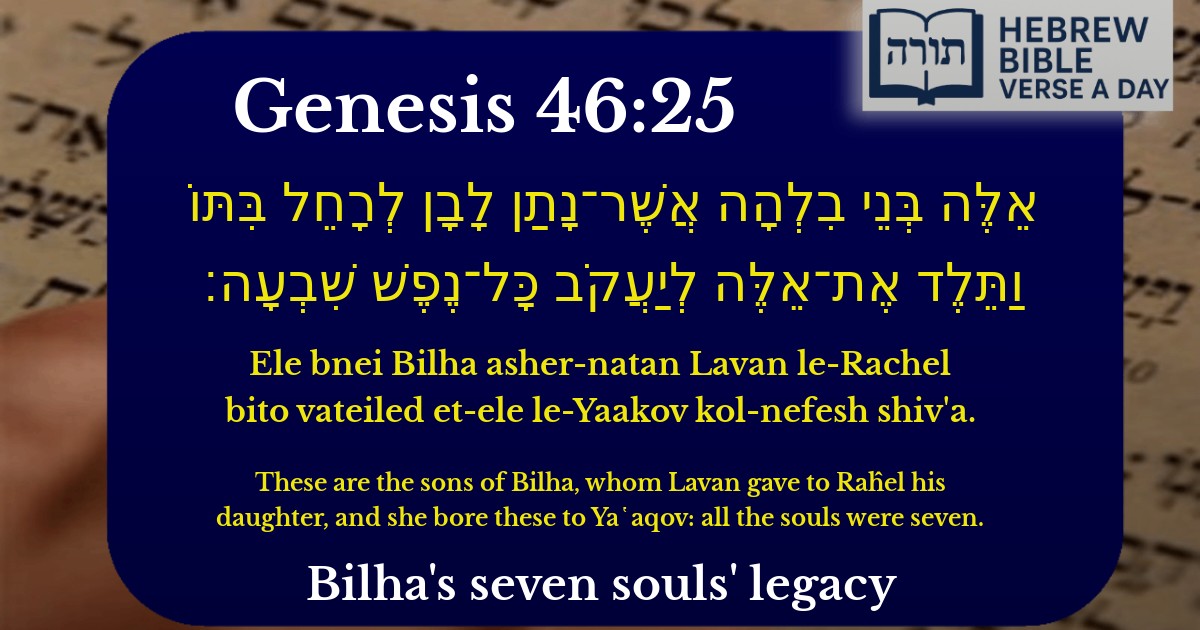Join Our Newsletter To Be Informed When New Videos Are Posted
Join the thousands of fellow Studends who rely on our videos to learn how to read the bible in Hebrew for free!
Hebrew Text
אֵלֶּה בְּנֵי בִלְהָה אֲשֶׁר־נָתַן לָבָן לְרָחֵל בִּתּוֹ וַתֵּלֶד אֶת־אֵלֶּה לְיַעֲקֹב כָּל־נֶפֶשׁ שִׁבְעָה׃
English Translation
These are the sons of Bilha, whom Lavan gave to Raĥel his daughter, and she bore these to Ya῾aqov: all the souls were seven.
Transliteration
Ele bnei Bilha asher-natan Lavan le-Rachel bito vateiled et-ele le-Yaakov kol-nefesh shiv'a.
Hebrew Leining Text
אֵ֚לֶּה בְּנֵ֣י בִלְהָ֔ה אֲשֶׁר־נָתַ֥ן לָבָ֖ן לְרָחֵ֣ל בִּתּ֑וֹ וַתֵּ֧לֶד אֶת־אֵ֛לֶּה לְיַעֲקֹ֖ב כׇּל־נֶ֥פֶשׁ שִׁבְעָֽה׃
אֵ֚לֶּה בְּנֵ֣י בִלְהָ֔ה אֲשֶׁר־נָתַ֥ן לָבָ֖ן לְרָחֵ֣ל בִּתּ֑וֹ וַתֵּ֧לֶד אֶת־אֵ֛לֶּה לְיַעֲקֹ֖ב כׇּל־נֶ֥פֶשׁ שִׁבְעָֽה׃
🎵 Listen to leining
Parasha Commentary
📚 Talmud Citations
This verse is not quoted in the Talmud.


Context in the Torah
The verse (Bereshit 46:25) lists the descendants of Bilhah, the maidservant whom Lavan gave to his daughter Rachel. These children—Dan, Naftali, and their descendants—are counted among Yaakov's household as they journey to Egypt. The Torah emphasizes that "all the souls were seven," referring to the total number of Bilhah's descendants who accompanied Yaakov.
Rashi's Explanation
Rashi (Bereshit 46:26) clarifies that the "seven souls" include:
Rashi notes that the phrasing "whom Lavan gave to Rachel" is significant—it underscores that Bilhah was originally designated for Rachel, even though she later became a secondary wife to Yaakov after Rachel's death.
Midrashic Insights
The Midrash (Bereshit Rabbah 94:9) highlights that Bilhah's children were considered equal to Rachel's own descendants, demonstrating the Torah's principle that the offspring of maidservants given to a wife are legally attributed to the wife herself. This reinforces the idea that Bilhah's sons, Dan and Naftali, were fully integrated into Yaakov's family.
Rambam's Perspective
Rambam (Hilchos Nachalos 1:7) discusses the inheritance rights of children born to maidservants like Bilhah. He rules that they inherit equally alongside children born to primary wives, as seen in Yaakov's family, where all twelve tribes—including those from Bilhah and Zilpah—received equal portions in Eretz Yisrael.
Symbolism of the Number Seven
The number seven ("sheva") is often associated with completeness in Jewish thought. Here, it signifies the wholeness of Bilhah's contribution to Yaakov's household. The Kli Yakar (Bereshit 46:25) suggests that this number also alludes to the future role of Dan and Naftali's descendants in completing the spiritual mission of Klal Yisrael.